

Untitled. Connectez-vous à votre compte. Online Discussions Introduction – Teaching with Technology. Thank you for participating in this session of L&S Learning Support Services’ online workshop series, “Teaching With Technology.”
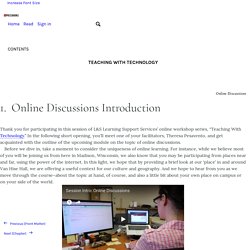
In the following short opening, you’ll meet one of your facilitators, Theresa Pesavento, and get acquainted with the outline of the upcoming module on the topic of online discussions. Before we dive in, take a moment to consider the uniqueness of online learning. For instance, while we believe most of you will be joining us from here in Madison, Wisconsin, we also know that you may be participating from places near and far, using the power of the internet.
In this light, we hope that by providing a brief look at our ‘place’ in and around Van Hise Hall, we are offering a useful context for our culture and geography. And we hope to hear from you as we move through the course–about the topic at hand, of course, and also a little bit about your own place on campus or on your side of the world. Overview. Question & Discussion Tools - Teaching Tools - Research Guides at Harvard Library. Another option for online discussions and questions is social media.
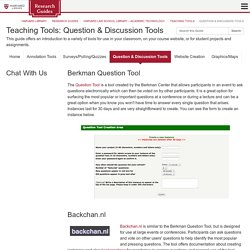
For this particular use, Twitter is a particularly popular choice, in part because there are many tools that support using Twitter in this way. To host a Twitter chat for a particular event or topic, you need to create a hashtag, which is the pound or hash symbol (#) followed by a short word, phrase and/or number. Everyone participating in the chat then includes that hashtag in all of their tweets. If you adopt this approach it is important to suggest tools that participants can use to follow the chat. Below are some options you might try: …for Course Designers. This page features a collection of carefully selected resources specific to course design for online and blended courses.

Each resource is categorized by type, identified by the icon to the right of each description. 1) An excellent site created by Contact North to serve faculty and instructors of post-secondary institutions in Ontario, Canada is The Ontario Online Learning Portal. It’s an open resource that provides numerous tools and information on the latest research and trends in online education. Learning effectiveness. Resources for Instructors. This section includes a collection of links by topic targeted to faculty, instructors, K-12 educators, and instructional designers looking for ideas, inspiration and/or skill development specific to online or blended learning and instruction.
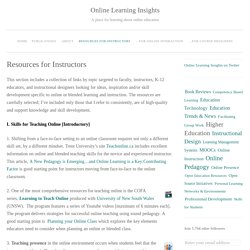
The resources are carefully selected; I’ve included only those that I refer to consistently, are of high-quality and support knowledge and skill development. I. Skills for Teaching Online [Introductory] 1. Shifting from a face-to-face setting to an online classroom requires not only a different skill set, by a different mindset. 2. 3. 4. 5. II. The level of instructor involvement [or not] in online learning environments is a controversial topic in the education sector. 1. 2. 3. 4. III. 1. How to Get Students to Participate in Online Discussions. This is the first post in a triplet series on how to create effective discussions in an online learning environment. This post discusses how course instructors can shape and create robust and rich discussions, in post two I”ll share facilitation strategies to develop and sustain course dialogue, and I’ll conclude the series with methods for assessing student contributions and participation in online forums.
Please note, this series addresses discussions in the context of online courses for credit – as forums in Massive Open Online Courses [MOOCs} are a different animal altogether [I will share my thoughts on MOOC discussion forums next month at the close of the MOOC course I am taking]. Getting students to ‘talk’ Getting students to participate in [brick and mortar] classroom discourse can be a painful process – the blank stares or worse students absorbed with their laptops or iPhones, which is disconcerting to say the least. Instructor involvement in Online Discussions? To be or not? This post is Part 1 of a 2 part series on Instructor involvement in Online discussions How important is discussion and discourse in learning?
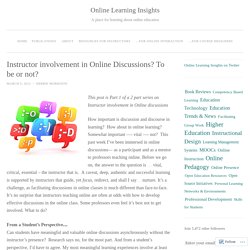
How about in online learning? Somewhat important —- vital —- not? This past week I’ve been immersed in online discussions— as a participant and as a mentor to professors teaching online. Before we go on, the answer to the question is … vital, critical, essential – the instructor that is. From a Student’s Perspective…Can students have meaningful and valuable online discussions asynchronously without the instructor’s presence? What the experts say about Instructor Participation…. Best Practices in Managing Online Discussions. About Faculty Focus. Through its free e-newsletter and dedicated website, Faculty Focus publishes articles on effective teaching strategies for the college classroom — face-to-face, online, blended, or flipped.

It’s also home to The Teaching Professor Blog, written by Maryellen Weimer, PhD. In December 2016, we launched Faculty Focus Premium, a rich repository of teaching tools and resources that deliver fresh ideas, keen insights, and best practices. Awards Faculty Focus is the winner of the 2017 MERLOT Faculty Development Classics Award.
In a press release, the MERLOT Faculty Development Editorial Board stated: “Faculty Focus is one of the most widely used faculty development resources in higher education. … Created in 2003, Faculty Focus has long been an important tool for the implementation of teaching improvement initiatives with faculty development professionals using Faculty Focus both as the basis for workshop activities, and for background and transformative readings for faculty.” What Research Tells Us about Online Discussion. Student discussion differentiates online education from the old correspondence courses.
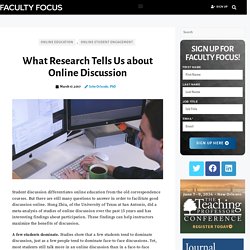
But there are still many questions to answer in order to facilitate good discussion online. Hong Zhiu, of the University of Texas at San Antonio, did a meta-analysis of studies of online discussion over the past 15 years and has interesting findings about participation. These findings can help instructors maximize the benefits of discussion. A few students dominate. Studies show that a few students tend to dominate discussion, just as a few people tend to dominate face-to-face discussions. The finding also reminds us that even in an online discussion, equal participation is not likely. While we want students to learn how to express themselves, we might also consider the legitimate role of a “passive participant.” Participation between students increases over time. This does not mean that online instructors should remove themselves entirely from discussion. Constructive interactions.
Reference. The Importance of Online Discussions and How to Make Them Awesome. Online Discussions: Tips for Instructors.